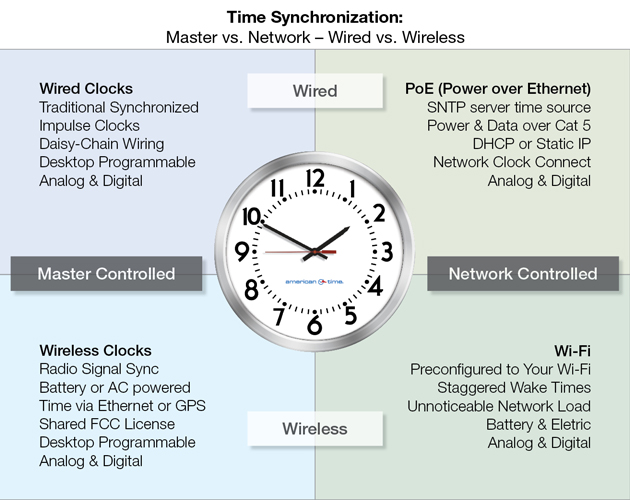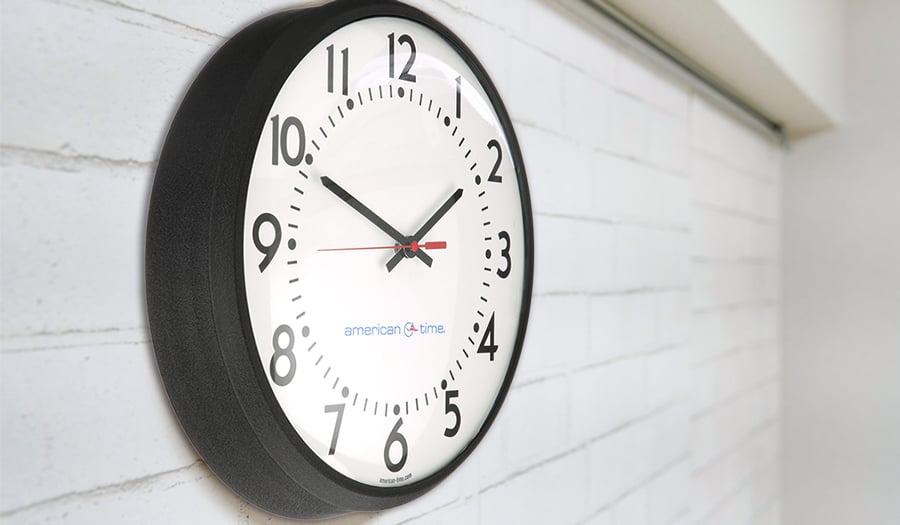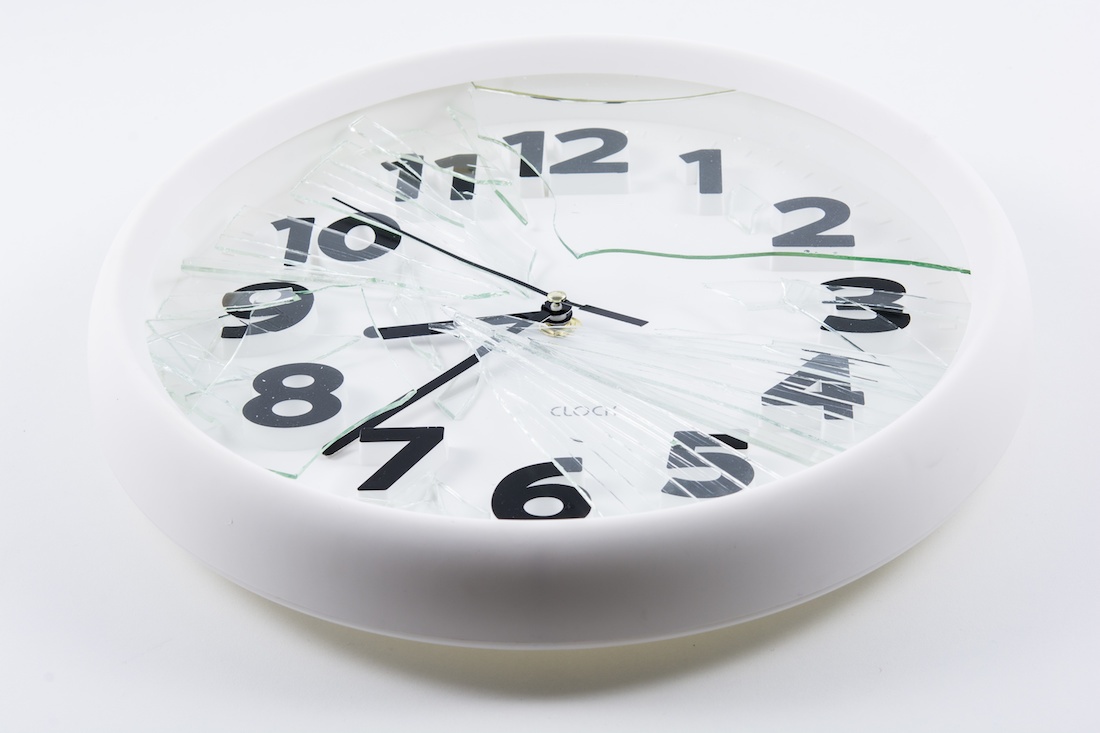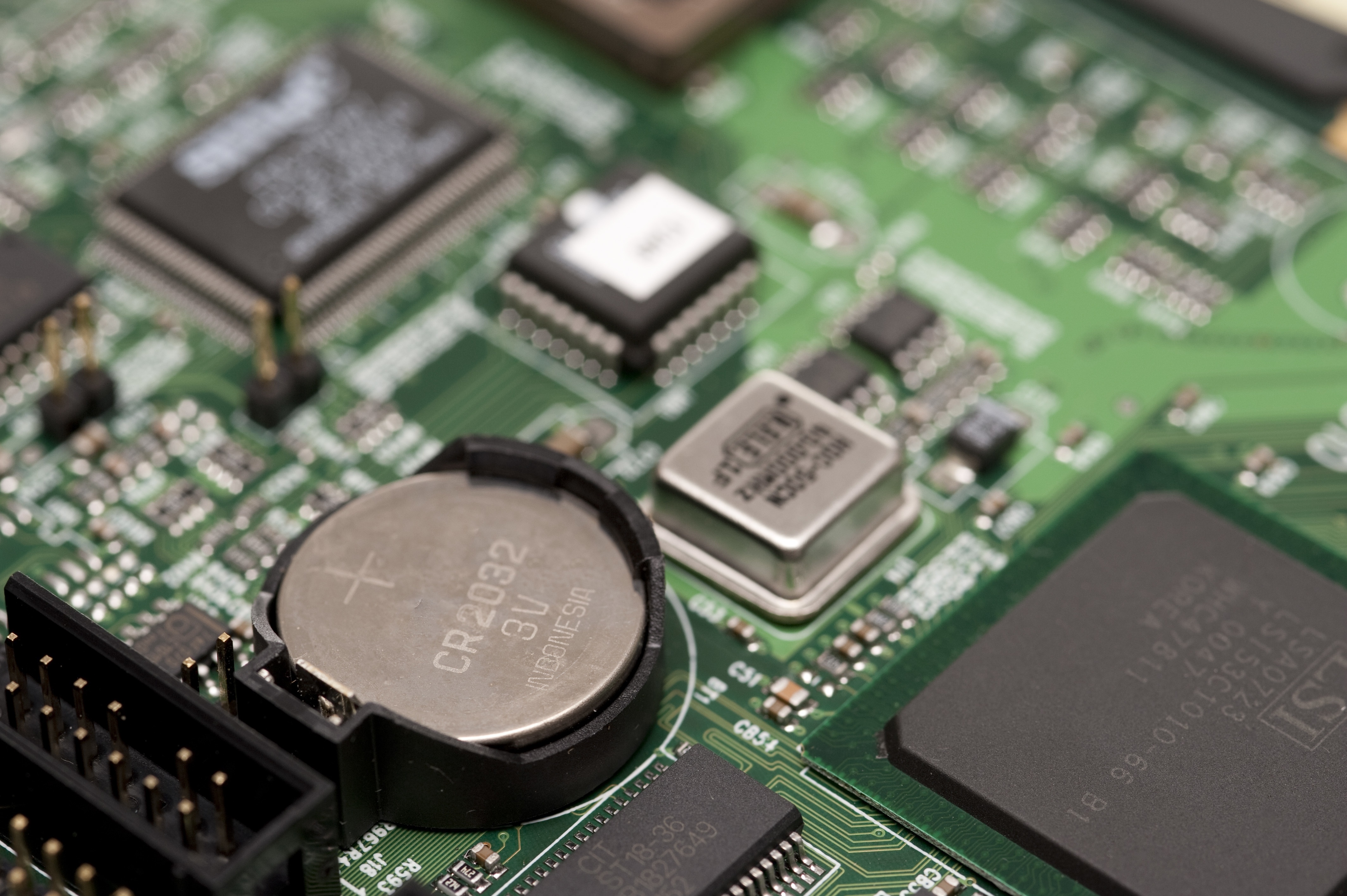Years ago, wired clock systems were the standard, reliable method to keep synchronized time in schools and businesses. Today, those clocks are still manufactured, but there are also wireless options, which utilize more modern technology to transform timekeeping.
So, which solution is best for your school or facilities?
Read More
Topics:
Synchronized Clock Systems,
Wired Clock Systems,
Wireless Clock Systems,
Master Clocks,
System Controllers
High-quality clocks that stay in precise synchronization must have access to two important sources to operate successfully: A power source and a time source.
However, terms like “wireless clocks” and “wired clocks” are commonly used but often misunderstood. In this article, you’ll learn more about these terms and what they mean for synchronized clocks in your building.
Read More
Topics:
Synchronized Clock Systems,
Wired Clock Systems,
Wi-Fi Clock Systems,
Wireless Clock Systems,
PoE Clock Systems
Accurate, synchronized clocks in your building, school or facility are more than a convenience. When clocks display the wrong time or different times from each other, major disruptions and even risks can happen, such as….
- Meetings, classes or shifts start and end at different times, causing confusion and inefficiency
- Wages or compensation are disputed
- Critical tasks like surgeries, food prep or manufacturing processes aren’t tracked or reported accurately
- Maintenance staff spend too much time on clock repairs and adjustments
| “Employees didn’t have reliable clocks for calculating shift changes or break times. There were lots of debates about whether an employee was really tardy or not, whether some people were abusing their break times by leaving early and returning late, and whether meetings were starting and ending on time.” DMR Electronics |
Read More
Topics:
Daylight Saving Time,
School Clock Systems,
Synchronized Clock Systems,
Wired Clock Systems,
Hybrid Clock Systems,
Wireless Clock Systems,
PoE Clock Systems,
EverAlert,
Digital Clocks,
Master Clocks
If you're tasked with selecting a clock system for your organization, the idea might be easy at first: You just buy some clocks and hang them on the walls, right?
But synchronized clock technology offer many options, and the best decision for you depends on the needs of your organization. Here, we'll help determine which type of clock is best for you depending on your industry and the type of building you're responsible for keeping on time.
Read More
Topics:
School Clock Systems,
Synchronized Clock Systems,
Wired Clock Systems,
News,
Clocks for Healthcare,
Higher Education,
Wi-Fi Clock Systems,
Wireless Clock Systems,
PoE Clock Systems,
Architecture,
manufacturing,
Healthcare Facilities,
Facility Management
Daylight saving time (DST) changes were formally established in most of the United States almost 60 years ago, but the biannual changes continue to be a hassle for maintenance teams, facility managers, IT staff and anyone else in charge of keeping a building running smoothly.
Here are some tips for preparing your clocks for DST and troubleshooting if things don’t go as planned.
Read More
Topics:
Daylight Saving Time,
Synchronized Clock Systems,
Wired Clock Systems,
Wireless Clock Systems,
SiteSync,
Timekeeping,
Master Clocks,
Facility Management
Follow the tips below to ensure your clocks and clock systems are ready for the time change.
Routinely check your clocks leading up to Daylight Saving Time
The beginning and end of Daylight Saving Time serve as natural reminders to make sure your facility's clocks are reliably keeping everyone on schedule.
To ensure that a wired system clock is syncing correctly, unplug it, wait at least 10 seconds, and plug it back in. The clock should be receiving synchronization signals from the master controller and display the correct time within 24 hours.
You can take a similar approach to your wireless system battery-operated clocks. Take the battery out, assuring the clock hands come to a complete stop, and reinstall it.
This is a good time to check the life of your batteries, too. If a battery is supplying 1.5 volts or more, it should be good to go. The clock will automatically be on time within 12 hours or sooner.
Read More
Topics:
Daylight Saving Time,
Synchronized Clock Systems,
Wired Clock Systems,
Wi-Fi Clock Systems,
Wireless Clock Systems,
Timekeeping
In rare cases, clocks that are supposed to display precise time and synchronize with each other may fall out of time. Here are a few quick and easy ways to troubleshoot and keep them ticking on the right time.
Read More
Topics:
Clock Maintenance and Repairs,
Synchronized Clock Systems,
Wired Clock Systems,
AllSync,
Wi-Fi Clock Systems,
Wireless Clock Systems,
PoE Clock Systems,
SiteSync
To grill with gas or charcoal. To drive an electric car or opt for internal combustion. To eat oatmeal or Pop-Tarts for breakfast. When it comes to selecting an energy source for our daily needs, we have more options now than ever.
These decisions extend to the basic operations of any large facility, including its clocks. When you're selecting clocks for your school, factory, or medical facility, you have two options for a power source: electric or battery-operated.
The right choice often depends on the resources at your disposal and how you plan to deploy your clocks. Here are the pros and cons of both battery and electric clocks.
Read More
Topics:
Wired Clock Systems,
Wireless Clock Systems
How many times have you had to return a new shirt or a pair of jeans?
Sometimes the clothes just don't look right when you get home from the store. Maybe that's due to different lighting or the store's trick mirrors. Or, maybe your clothes just don't fit the same as you thought they would. After all, sizes are usually a bit different from brand to brand, so it's risky to buy clothes without trying them on.
Read More
Topics:
Wired Clock Systems
When looking at buying a new clock system, it is important to understand the difference between network clocks and system clocks. Deciding between the two will depend on how you plan to use your clock and how your building is wired and constructed. Here is an explanation of what each one does, and a few tips to consider when choosing between network and system clocks.
Read More
Topics:
Wired Clock Systems,
Videos,
Wi-Fi Clock Systems









